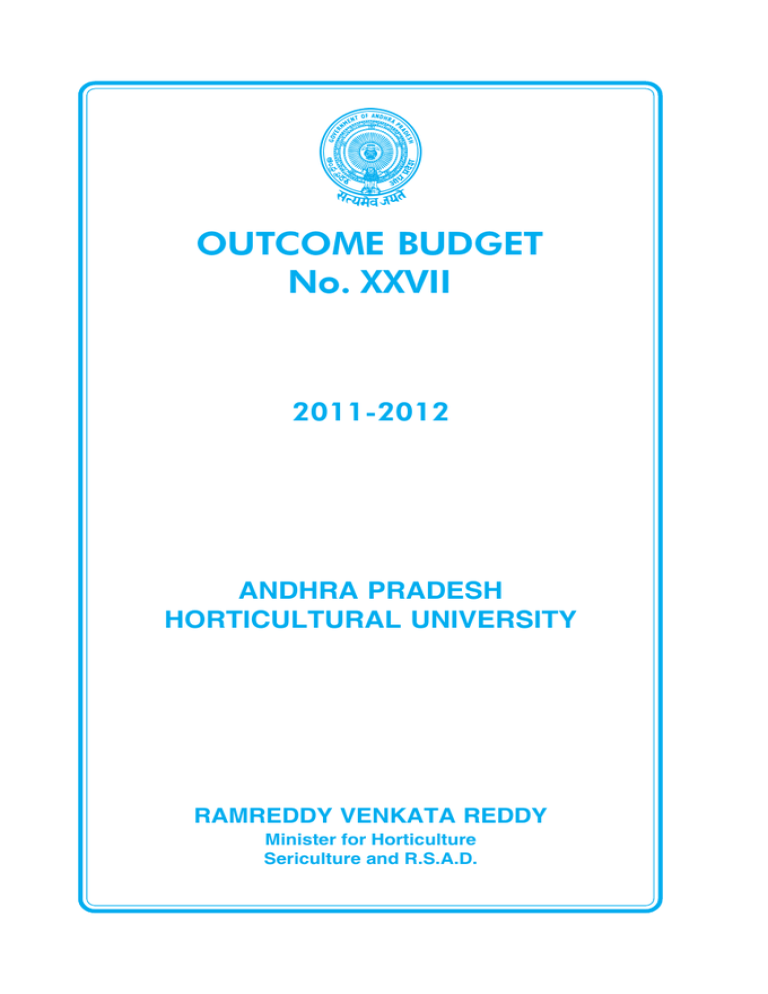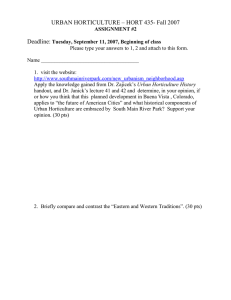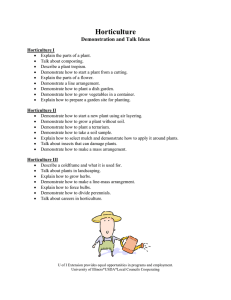Outcome Budget 2011
advertisement

OUTCOME BUDGET No. XXVII 2011-2012 ANDHRA PRADESH HORTICULTURAL UNIVERSITY RAMREDDY VENKATA REDDY Minister for Horticulture Sericulture and R.S.A.D. OUTCOME BUDGET No. XXVII 2011-2012 ANDHRA PRADESH HORTICULTURAL UNIVERSITY RAMREDDY VENKATA REDDY Minister for Horticulture Sericulture and R.S.A.D. ANDHRA PRADESH HORTICULTURAL UNIVERSITY OUTCOME BUDGET EXECUTIVE SUMMARY Andhra Pradesh Horticultural University is started functioning from September, 2007 to serve the people of Andhra Pradesh through over all development in the field of Horticulture and allied sectors. The University is being constantly engaged in 3 important functions of Education, Research and Transfer of Technology. The Govt. have issued orders for establishment of Horticultural University at Venkataramannagudem near Tadepalligudem in West Godavari dist. with four Constituent colleges of Horticulture at Venkataramannagudem (West Godavari Dist.), Anantharajupet (Kadapa Dist.), Mojerla (Mahaboobnagar Dist.) as per G.O.Ms.No.134/ Agriculture & Co-op./Horti. Department Dated: 26.6.2007 and College of Horticulture, Rajendranagar, Hyderabad as per G.O.Ms.No.213/Agri./Coop/Hort/Dept., dated 26.6.2007. Under the provision of the Act, Board of management was constituted, first Vice-Chancellor of Horticultural University was appointed. Two Horticultural Polytechnics functioning at Ramachandrapuram in East Godavari Dist., and one at Adilabad in Adilabad Dist, in addition to 27 Research Stations working on Horticulture crops are transferred to Horticulture University as per the recommendations of Committee on establishment of Horticulture University in Andhra Pradesh. Three more polytechnic colleges are started at Kalikiri, Madakasira Centenary colony and Ramagirikilla during 2009-10. Three new Krishi Vignan Kendras at Venkatarammanagudem, West Godavari District, Pandirimamidi, East Godavari District and Ramgirikilla, Karimnagar District were established by ICAR during 2010-2011. 1 A.P. Horticultural University is financed by State Govt. under plan component. The budget allocation for the period 2011-12 is Rs. 3500.00 lakhs under Plan by the Govt. During the year 2010-11 a total of 251 students are admitted into undergraduate degree programme in 4 Colleges of Horticulture. A total of 47 PG students and 7 Ph.D students are also admitted during 2010-11. One hundred and thirty (130) students are admitted in 5 polytechnics during the year 2010-11. The budget allotted will be utilized by the University for the production of students in under graduate, post graduate and diploma programmes, development of varieties/hybrids, standardization of location specific technologies and transfer of technologies of horticulture crops in the State of Andhra Pradesh with the final objective of socio-economic upliftment of Horticultural farmers of the State. 2 CHAPTER - I INTRODUCTION The A.P. Horticultural University second of its kind in India, is established in Andhra Pradesh to meet the needs of Horticulture farmers and processors and recognizing the importance of Horticulture and its growth potential and strong co-ordination between education, training and development, with the Head quarters at Venkataramannagudem in West Godavari Dist of A.P. The University started functioning from September, 2007 onwards. The University would be constantly engaged in the three functions of:● Generating trained manpower through teaching. ● Developing profitable technology through Research ● Assist in process of Transfer of technology through Extension. The new A.P. Horticultural University is formed with the department separated from ANGR Agricultural University and started functioning, at its new campus at Venkataramannagudem of West Godavari Dist. The University at present has: ● 4 colleges and 5 polytechnics ● 27 Research Stations spread in 9 Agro Climatic Zones in the State. ● 3 Krishi Vignan Kendras Mandate of University: The main mandate of University is: (a) To train manpower through imparting education (b) Conduct location specific Research and (c) Organize extension activities for the benefit of the personal and line departments of the government and N.G.O’s, Farmers and others. 3 The specific functions are ● To train the manpower needed for horticulture and allied sectors like processing etc., for the development of the state (Education). ● Constantly improve and generate technologies for increasing production, processing, and marketing, through horticulture and allied sectors (Research). ● Assist to the development of departments of the Govt. in the process of disseminating improved technology to the Horticulture crop growers of the State (Extension/Transfer technology). ● Explore international trade for fruits, vegetables, and flowers and processors of food. 4 Organization: The board of management will govern the university and will be the apex body endowed with the responsibility of policy decisions. The Vice-Chancellor of the University will be the chairman of the board of management. The Vice-Chancellor will be the chief executive and head of the University administration. He will be supported by the Registrar who will be responsible for general administration and the Comptroller will look after the financial management. The teaching programs will be under overall supervision of Dean of Horticulture. The Associate Deans are the academic and administration heads of the colleges. The overall research activities of the university will be carried out under the administrative control of Director of Research. The Dean of Student affairs, Director of Extension, University Librarian and Estate Officer will be assisting for proper functioning of the University. Academic courses: Th.e University will offer courses at Under Graduate and Post Graduate level in Horticulture. Diploma programme in Horticulture will also be offered at five centers of the University. The University will continue its research efforts in horticulture and allied fields with renewed vigour and commitment for improving production and economic status of the fruit growers of the State. Research Activities: The research activities of the university in respect of Horticulture will be carried out in 27 research stations spread over the entire state of A.P. The research activities of the University mainly focus on crop improvement, crop production and crop protection, aspects for adoption by the planting community for overall increase in horticulture production besides solving location specific problems. 5 On-farm research: On-farm research will also be conducted for evaluation and refinement of newly developed technology at farmer’s field conditions. Extension activities Education of Rural people in horticulture and allied areas will be one of the main functions of horticulture extension. Extension activities of the university will include: ● Technology assessment and refinement ● Training master trainees and farmers. ● Organizing Kisan Melas, Exhibitions, and Rythu sadassu. ● Maintaining horticulture information centres. ● Dissemination of information through Electronic media. 6 CHAPTER - II STATEMENT OF BUDGET ESTIMATES A.P. Horticultural University is financed by State Government under Plan. The Plan assistance is by way of block grants for running the institution. The financial assistance provided to A.P.Horticultural University under Plan is Rs. 3500.00 lakhs, for all the activities of the University. Scheme wise objectives/outcomes: Out lay for 2011-12 Physical outputs, project outcomes are furnished in Annexure-II. 7 CHAPTER - III Reform measures and initiatives: Academic : Three New Horticultural Colleges: Rural Work Experience Programme and Other Internship Programmes: The Rural Work Experience Programme is a pioneering academic innovation, introduced for the first time by ANGRAU, in the country, during the year 1979-80, which was recommended by ICAR for adoption by the other Agricultural Universities. This programme provides opportunities for final year students of B.Sc(Ag)/ B.Sc(Hons.) Horticulture to gain insight and experience in field operations and problems related to farming and rural life, by staying in villages for one semester of 5 months duration. This programme will be extended to B.Sc (Hons.) Horticulture in A.P.H.U. also. RESEARCH: Three Research Stations in three zones will be upgraded to Regional Horticultural Research Station at Sangareddy, Anantharajupet and Vijayarai. INTENSIFIED RESEARCH FOLLOWING AREAS: ● ● ● ● ● ● ● ACTIVITIES Biotechnology Water management Micro irrigation Dryland Horticulture Product development and value addition Captive cultivation of flower crops Post harvest Technology. EXTENSION ACTIVITIES ● ● Transfer New technologies Monitoring of Pest and disease management 8 ON THE ● ● ● ● ● ● Organized Rythusadasu at District and State level. On farm demonstration and also in farmers field trials through KVKs’ Regular Mass media presentation for productivity enhancement in TV and Radio. Publication of crop bulletins in Telugu Organizing field days Zonal Research and Extension Adisory Council meetings at Venkataramannagudem Andhra Pradesh Horticultural University head quarters. CHAPTER - IV Review of past performance and achievements: Academic: Under-Graduate admissions: During the year 2010-11, a total of 251 students (including ICAR and HORTICET quota) are admitted in the four Colleges of Horticulture at Venkataramannagudem, West Godavari Dist., Mojerla, Mahaboobnagar Dist, Anantharajupet, Kadapa Dist and Rajendranagar, Ranga Reddy Dist. Post-Graduate admissions: A total 47 P.G students (including ICAR quota) and 7 Ph.D students were admitted in Post-graduation programme of Horticulture during 2010-11 at College of Horticulture, Rajendranagar and at College of Horticulture, Venkataramannagudem. Horticulture polytechnic admissions: During 2010-11, 130 students have been admitted in the five polytechnics of Horticulture at Ramachandrapuram in East Godavari Dist., at Adilabad in Adilabad Dist., at Kalikiri in Chittoor Dist., at Madakasira in Ananthapur Dist. and at Ramagirikhilla in Karimnagar Dist. 9 10 -Nil- -Nil- State Plan ICAR G.O.I KVK Total 1 to 5 2. 3. 4. 5. -Nil- -Nil- -Nil- -Nil- -Nil- -Nil- (4) 1859.18 -Nil- 47.86 649.78 1161.54 -Nil- (5) 1992.00 -Nil- 39.96 635.77 1316.27* -Nil- (6) 4353.96 -Nil- 90.74 869.46 3393.76 -Nil- (7) Receipts 4353.96 -Nil- 90.74 869.46 3393.76 -Nil- (8) Expenditure 2009-10 the year 2008-09. * Government of A.P. has not released 4th quarter amount of Rs.387.22 lakhs pertaining to salaries and contingencies during -Nil- -Nil- -Nil- -Nil- Non-Plan 1. (3) (2) Expenditure 2008-09 Expenditure Receipts 2007-08 Receipts (1) Expenditure Sl.No. Details of (Rs. in lakhs) ANDHRA PRADESH HORTICULTURAL UNIVERSITY, VENKATARAMANNAGUDEM DETAILS OF RECEIPTS & EXPENDITURE PARTICULARS FOR THE PERIOD 2007-08 TO 2009-10 Chapter - V CHAPTER - VI The objectives of newly started Andhra Pradesh Horticultural University is being achieved since its inception keeping the frame work of the objectives and to meet the challenges of changing horticulture scenario at national and international levels in the context of globalization. The priority areas covering the basic mandate of the university in education, research and extension are given major emphasis. The amount sanctioned and intends for various items of expenditure of this new university have justifiably utilized for the purpose for which is provided. Additional grants are also being requested from ICAR for the submitted projects on priority basis. The teaching, research and extension activities being carried out by the university in the state of A.P. will benefit the horticulture crop growers and help in the socio-economic up-liftment of farmers of Andhra Pradesh. RAMREDDY VENKATA REDDY Minister for Horticulture Sericulture and R.S.A.D. 11 12 1 1 2 S.No 2415 – Horticulture Research and Education (01) – Crop Husbandry MH – 120 – Assistance to other institutions G.H. 11 – Normal State Plan S.H. (05) – Assistance to A.P. Horticultural University 2 Non Plan State Plan Name of the Scheme / Programme To train human resources needed in Horticulture through four colleges and 2 polytechnics. To develop varieties / hybrids and technologies for Horticulture crops through 18 research stations. Assistance in the process of technologies through K.V.K’s, Bio-tech, dry land horticulture, Mango Research, intensification of horticulture research, coconut on farm research production technology of Tissue culture Banana, Research on pomegranate, Research on Onion, Medicinal and aromatic crops, Technology for export orientation, irrigation water management in horticulture, production on Bio agents, research on micro irrigation, organic farm research, contract research, Schemes on Cashew nut, Betelvine, coconut, Oil Palm, chilies, vegetables, Turmeric, Post harvest technology, Banana, citrus, Aromatic and Medical plants and Grapes, Floriculture, Tuber crops, Mango Dry land horticulture, Pepper, Onion. 3 Objective / Outcome 5 Quantifiable deliverables / Physical Out puts Out turn of students in U.G. and P.G. programmes, Number of varieties / hybrids under technology developments under fruits, vegetables and spices, Number of training programmes / Kisanmelas to be organized. Number of varieties for hybrids under technology development for fruits, vegetables and spices. Number of varieties / hybrids and technologies developed for the fruits, vegetables and spices Out lay 2011 - 12 (Rs. in thousands) Complementary Non-Plan Plan extra budgetary Budget Budget Resources 4 Shifted to State Plan Out turn of students under UG, PG and Ph.D. programmes, Development of varieties / hybrids under technology development under fruits, vegetables and spices, Number of training programmes / Kisanmelas to be organized. Number of varieties for hybrids under technology development for fruits, vegetables and spices. Number of varieties / hybrids and technologies developed for the fruits, vegetables and spices 6 Project outcomes Annexure – II Outcome Budget 2011 – 2012 Department Name : A.P. Horticultural University p y By Research : It is a continuous process generally 5 to 7 years. Research : It is a continuous process generally 5 to 7 years. Research : Research is a continuous process generally 5 to 7 years. By teaching outturn of the students could be measured every year. 7 Process / Timelines Quantifiable deliverables could be accessed only after testing and release of varieties and field technologies generally 7 to 9 years Quantifiable, deliverables could be arranged only after testing and release of varieties and field verification of technologies generally 7 to 9 years. 8 Remarks / Risk factors 13 1 3 To train human resources needed in Horticulture through four colleges and 2 polytechnics. To develop varieties / hybrids and technologies for Horticulture crops through 18 research stations. Assistance in the process of technologies through K.V.K’s, Bio-tech, dry land horticulture, Mango Research, intensification of horticulture research, coconut on farm research production technology of Tissue culture Banana, Research on pomegranate, Research on Onion, Medicinal and aromatic crops, Technology for export orientation, irrigation water management in horticulture, production on Bio agents, research on micro irrigation, organic farm research, contract research, Schemes on Cashew nut, Betelvine, coconut, Oil Palm, chilies, vegetables, Turmeric, Post harvest technology, Banana, citrus, Aromatic and Medical plants and Grapes, Floriculture, Tuber crops, Mango Dry land horticulture, Pepper, Onion. 2 2415 – Horticulture Research and Education (01) – Crop Husbandry MH-789 – Special component plant for Schedule Caste G.H. 11 – Normal State Plan S.H. (05) – Assistance to A.P. Horticultural University 4 5 6 7 Out turn of students in U.G. and P.G. programmes, Number of varieties / hybrids under technology developments under fruits, vegetables and spices, Number of training programmes / Kisanmelas to be organized. Number of varieties for hybrids under technology development for fruits, vegetables and spices. Number of varieties / hybrids and technologies developed for the fruits, vegetables and spices 8 Out turn of students under UG, PG and Ph.D. programmes, Development of varieties / hybrids under technology development under fruits, vegetables and spices, Number of training programmes / Kisanmelas to be organized. Number of varieties for hybrids under technology development for fruits, vegetables and spices. Number of varieties / hybrids and technologies developed for the fruits, vegetables and spices By Research : It is a continuous process generally 5 to 7 years. Research : It is a continuous process generally 5 to 7 years. Research : Research is a continuous process generally 5 to 7 years. By teaching outturn of the students could be measured every year. Quantifiable deliverables could be accessed only after testing and release of varieties and field technologies generally 7 to 9 years Quantifiable, deliverables could be arranged only after testing and release of varieties and field verification of technologies generally 7 to 9 years. 14 1 35,00,00 25,00,00 6 Total 5 10,00,00 4 310 – Grants-in-Aid 311-Grants-in-Aid towards salaries 312 – Other Grants-in-Aid 3 To train human resources needed in Horticulture through four colleges and 2 polytechnics. To develop varieties / hybrids and technologies for Horticulture crops through 18 research stations. Assistance in the process of technologies through K.V.K’s, Bio-tech, dry land horticulture, Mango Research, intensification of horticulture research, coconut on farm research production technology of Tissue culture Banana, Research on pomegranate, Research on Onion, Medicinal and aromatic crops, Technology for export orientation, irrigation water management in horticulture, production on Bio agents, research on micro irrigation, organic farm research, contract research, Schemes on Cashew nut, Betelvine, coconut, Oil Palm, chilies, vegetables, Turmeric, Post harvest technology, Banana, citrus, Aromatic and Medical plants and Grapes, Floriculture, Tuber crops, Mango Dry land horticulture, Pepper, Onion. 2 2415 – Horticulture Research and Education (01) – Crop Husbandry MH-796-Tribal Area sub-plan G.H. 11 – Normal State Plan S.H. (05) – Assistance to A.P. Horticultural University 7 Out turn of students in U.G. and P.G. programmes, Number of varieties / hybrids under technology developments under fruits, vegetables and spices, Number of training programmes / Kisanmelas to be organized. Number of varieties for hybrids under technology development for fruits, vegetables and spices. Number of varieties / hybrids and technologies developed for the fruits, vegetables and spices 8 Out turn of students under UG, PG and Ph.D. programmes, Development of varieties / hybrids under technology development under fruits, vegetables and spices, Number of training programmes / Kisanmelas to be organized. Number of varieties for hybrids under technology development for fruits, vegetables and spices. Number of varieties / hybrids and technologies developed for the fruits, vegetables and spices By Research : It is a continuous process generally 5 to 7 years. Research : It is a continuous process generally 5 to 7 years. Research : Research is a continuous process generally 5 to 7 years. By teaching outturn of the students could be measured every year. Quantifiable deliverables could be accessed only after testing and release of varieties and field technologies generally 7 to 9 years Quantifiable, deliverables could be arranged only after testing and release of varieties and field verification of technologies generally 7 to 9 years.


